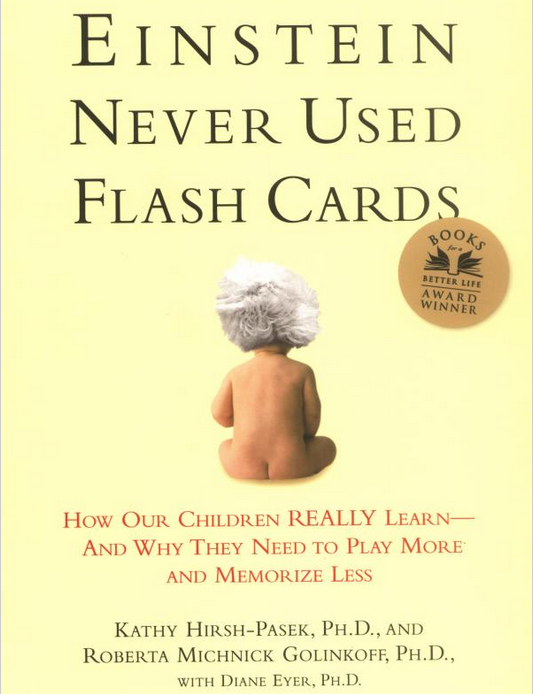Different learning differences
Last Sunday another forum writer responded to the article written by Ms Sandra Davie. His letter “Hot-housing pre-schoolers has its limits” took a different angle from what I wrote here. I want to take this opportunity to talk about the difference between helping a child overcome a learning disability, and letting the child learn at his own pace.
I cannot locate an online copy of the forum letter, but here is an extract of two paragraphs:-
“Hot-housing in specific areas such as literacy and numeracy may not help if children are not yet ready.”
“Parents should not worry if their child cannot really read or count by age seven. Their support and belief in their child will enable him to catch up later on.”
I agree with the first paragraph completely. I think the second paragraph requires a caveat.
Some time ago, I came across this book – “Einstein never used flashcards: How our children really learn – and why they need to play more and memorize less”.
The main point of the book was that children learn naturally through daily living, and unstructured play. That’s nothing new. But what was interesting for me was the “why” behind it – why do children need to play to learn? Apparently, certain things CANNOT be taught – the child just has to “get” it and he “gets” it through experience and play.
Here is an example about learning to count. There are five principles which a child needs to understand before he can understand counting:-
- One-to-one correspondence – that one item gets only one number ‘tag’.
- Stable-order principle – that there is a fixed list of numbers, i.e. even if they get the list wrong (e.g. one, two, five seven), they get it consistently wrong.
- Cardinal principle – that the number of items in a set is the same as the last number tag, i.e. if the last number is five, there are five items.
- Abstraction principle – that they can count anything (e.g. cars, sweets, dots, etc).
- Order-irrelevance principle – that it does not matter where you start counting (e.g. if you line objects in a circle, you can start counting from any object; the number remains the same).
The book asserted that we cannot teach counting principles to a 2-year old, as they need physical experience with the objects to work them out for themselves. By age 3, most children seem to operate according to these principles most of the time.
Another concept that needs to be mastered is that of the number-line. To truly understand addition and subtraction, the child has to be able to use the principles of counting with knowledge of the number line. The book stated that this seems to happen at around 5 or 6 years of age in most children.
That was such a revelation to me, and it corresponded with my own experience. One of my son has no issue with maths – he naturally understands it and enjoys playing with numbers – I did not need to teach him – he discovered many mathematical concepts on his own. The other was always catching up with the ridiculously difficult and abstract Singapore primary school maths. Yet another one of my son simply does not get it, no matter how much I teach him.
Yet for the two who took the longest time to “get” a concept, there will be one day when they would “suddenly get it”. Over time, I realised that their minds have simply matured sufficiently to understand the concepts.
It was the same for reading and writing. One of the skills the child needs to have before he can read and spell is phonological awareness, i.e. the ability to differentiate the sounds in a single word, e.g. C-A-T. Some children simply CANNOT hear the individual sounds. Until such time when they can hear them, a child will have difficulties learning to read and spell. This is a skill which the child must acquire before moving on. Pushing the child to learn reading and spelling without overcoming this lack of phonological awareness creates a false sense of success because the child is really not learning the sounds – but simply memorising the words – and it is unsustainable.
Like understanding mathematical concepts, acquiring phonological awareness requires time and experience, and while we will continue to teach, train and expose the child, we also have to be patient and wait for the child to “get” it.
So my first point is – whatever it is we teach our children – they have to be ready mentally to understand the concept for learning to occur. Otherwise it is just rote learning, and the concept will not stay with them, and they will also not be able to apply it in other situations.
My second point is, however, for dyslexic children, it is not just a matter of “waiting for their brains to mature”. Yes, if a dyslexic child has poor phonological awareness, we would have to wait for him to overcome that part before moving on. But beyond that point, the dyslexic child has to be explicitly taught the rules and generalizations of English sounds and spellings.
Again, this corresponds with my personal experience – I never had to teach my older two boys how to read. They went to kindergarten, I read to them, and then they started reading on their own. But my youngest boy just did not recognise words no matter how much I had read to him, not even after I have sent him for reading classes. However, once I started TEACHING him English, I saw the lightbulb turn on in his head. (In order not to over-sell, I must clarify that my son is still learning slowly, but I can see a difference).
I will separately write about dyslexia, but I just want to say that this group is different from slow learners, and parents should ensure that they correctly classify their child in one, or the other.
So if your child is a slow learner, hot-housing him will not work – he needs time to mature. If your child has a learning disability like dyslexia, he might need professional help before he can really improve, but that is NOT hot-housing, because even with professional help, the child also needs time to mature.


You are absolutely right. I have been reading more and more evidence of the importance of play in children but why do we still allow ourselves to be measured by a small facet of a child’s development : numeracy and literacy? However this has become so commonplace that many times I feel pressurized to join in the rat race for kids.
Hi Althea! We still allow ourselves to be measured that way because it takes time for our minds to be renewed.
This is such an important issue, it takes more than a reply here to address it. 🙂
I understand perfectly what you mean. It took me a long time to be “stable” in my thinking about what is important to me, and my children. But it will come, if you continue to challenge your thinking, and intentionally align your actions and behaviours to your desired values.
After doing it differently all these years, I find my children so different from other children, and they are a joy. There are many other parents like me. You won’t be alone in your endeavour to be different.
I’m curious, for those children who cannot differentiate the phonological sounds, do they speak well? Are they able to pronounce the words appropriately? Am
I correct to assume that those who cannot hear also cannot pronounce the words accurately? Because if they can’t differentiate the sounds how can they possibly be able to pronounce the words?
Hi homeschool@sg, thanks for the question, and I apologise for this late reply.
I had to do some research and thinking to give a proper answer to this question 🙂
In any case, I intend to write more about dyslexia and also this issue about phonological awareness, but here is an answer to your specific question.
It is possible that someone may be able to pronounce the words but may still have poor phonological awareness. When we say “unable to hear”, we do not mean being unable to hear as in being deaf, but being unable to process the sound that they are hearing. E.g when you pronounce the letter name – ‘A’, can you hear that it is actually a gliding sound?
Even when you teach a child with no problem with phonological awareness, he may not immediately recognise the components of the letters, even though he may be able to pronounce it well.
E.g. the “tr” consonant blend in “train”. My son has problem hearing the “t” and “r” – you might want to try with your child, and see if she can hear the individual sounds. or does she think that it is a “ch”.
I am still learning about this topic, but I have realised how complicated the whole process of learning to read and spell actually is, and how many things need to go right, before a child can actually learn.